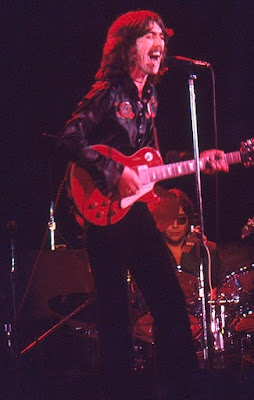The Dark Horse Succeeds
By David Marsh
Newsday
December 16, 1974
George Harrison decided to make his current tour as a sort of "declaration of independence" from the Beatles because he has been the chief naysayer to rumors of independent reunion for the "fab mop tops", as he elliptically referred to them yesterday afternoon at his first Nassau Coliseum concert.
And because he is also a heavy-handed evangelist for the Indian religious sect of which he is a member, it is not chic to enjoy his concerts. That's a shame because Harrison is playing his heart out on this tour.
Harrison assembled a fine band for the tour. It includes Tom Scott and Robbie Ford of the LA Express, the group that also toured with Joni Mitchell, Andy Newmark, and Jim Keltner on drums. And the legendary bassist Willie Weeks and Billy Preston, a star in his own right, on keyboards. It was Preston who got the crowd to its feet, but it was Harrison and his songs that kept them there.
Unfortunately, Harrison didn't capture the crowd so completely until near the end of his two and one half hour performance. The earlier portions of the program were slowed down by the insertion of four raga-rock numbers written but not performed by Ravi Shankar, Harrison's musical guru. (George even referred to himself self as "George Shankar" at one point.) Shankar is recuperating from a bout of nervous exhaustion, apparently brought on by the long, arduous tour.
After an intermission, Harrison returned and proceeded to rock with the selection of songs that ranged from early Beatles ("In My Life" by John Lennon, the only non-Harrison Beatles number in the show) to his current single "Dark Horse". Dark Horse is also the name of Harrison's new album and of the new record label for which he produces but does not record. It is a fitting name. When the Beatles split, Harrison seemed least likely to succeed. His achievements were considered the smallest of any of the members, although he was then riding high, having written Abby Road's biggest ballad, "Something."
But it was to Harrison's advantage that the demise of the Beatles coincided with the rise of rock's cult of musicianship. Lennon and Paul McCartney made their reputation as wits and songwriters. Ringo as a wit alone. Harrison was known only for his guitar playing. By the time of Bangladesh in 1971, he had become the most visible of the four. Since then, he has developed perhaps the strongest following of any of them.
The principal drawback is Harrison's defensiveness, the only Beatle to stick to their mid 60s conversion to Oriental mysticism. His records have increasingly reflected an obsession with that side of his life. It's hard not to feel that he is pushing a little too hard when he changes the lyrics of "In My Life" to "In My Life I Love GOD More," shouting the change. And it's even worse when he encores with the chant consisting of the names Christ, Buddha, Allah, and Krishna shouted over and over again.
Still, he succeeds in interesting even the cynical. His sore throat, which has plagued him throughout the tour, is actually an aid in this, making him seem more vulnerable and less arrogant than usual. And there are touches like his red sneakers, which remind us that he once was an important part of that light hearted phenomenon called The Beatles.
It is a blessing in disguise that Harrison is insecure enough to emphasize the end of the Beatles, even though he may do so for motives that are less than charitable, principally a desire to establish himself as a star. His insistence on being an ex, ex, ex-Beatle puts an end to the rampant necrophilia in the guise of nostalgia that prays for our Beatles reunion. The reunited Beatles won't save us, and maybe Krishna can't either, which is something we'll all have to live with. Rock and roll won't save your soul, either. But as Harrison obviously knows, even if he isn't letting on.


The writer went on to incur John's wrath in 1978 when he wrote an "open letter" to John in Rolling Stone, chastizing him for retiring.
ReplyDelete